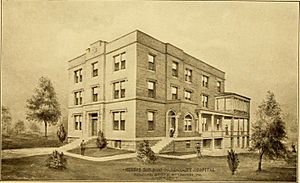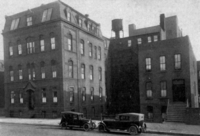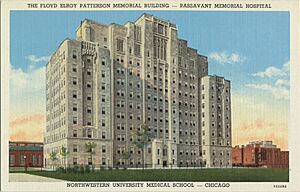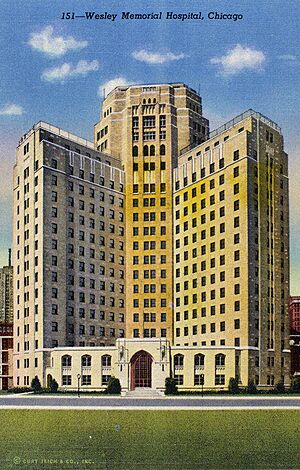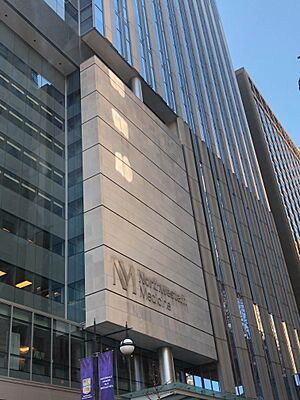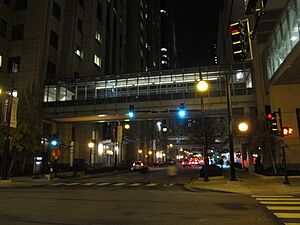Northwestern Memorial Hospital facts for kids
Quick facts for kids Northwestern Memorial Hospital |
|
|---|---|
| Northwestern Medicine | |
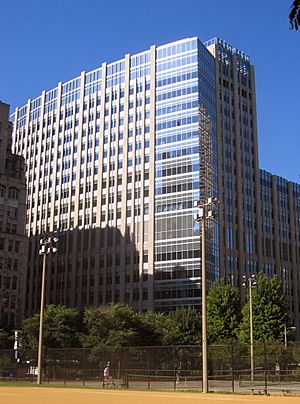
Prentice Women's Hospital, a building of Northwestern Memorial Hospital
|
|
| Geography | |
| Location | 251 East Huron Street, Chicago, Illinois, United States |
| Coordinates | 41°53′41″N 87°37′19″W / 41.89472°N 87.62194°W |
| Organization | |
| Funding | Non-profit hospital |
| Hospital type | Inpatient and outpatient, specialty and primary care, teaching |
| Affiliated university | Northwestern University Feinberg School of Medicine |
| Services | |
| Emergency department | I |
| Helipad | No |
| Beds | 894 |
| History | |
| Founded | September 1, 1972 |
Northwestern Memorial Hospital (NMH) is a big teaching hospital in Chicago, Illinois. It's located on Northwestern University's campus. This hospital is the main one for Northwestern Medicine. It's also where students from the Northwestern University Feinberg School of Medicine learn to become doctors.
Other important places on the campus include the Lurie Children's Hospital, which helps kids with serious injuries. There's also the Shirley Ryan AbilityLab, which is a top center for helping people recover from injuries or illnesses.
In 2022, a report by U.S. News & World Report said Northwestern Memorial was the best hospital in Chicago and Illinois. It was also ranked #9 in the whole country. The report also said it was one of the top hospitals in 11 different medical areas.
Contents
Hospital History
How It Started
Northwestern Memorial Hospital's story began in 1865. A local reverend named William A. Passavant Sr. and Lucy Rider Meyer started a hospital called Deaconess Hospital of Chicago. It had 15 beds and helped 75 patients in its first year. Most of them received care for free.
In 1871, the Great Chicago Fire destroyed Deaconess Hospital. Passavant couldn't afford to rebuild it right away.
Fourteen years later, in 1885, Passavant opened a new hospital. It was called "Emergency Hospital" and helped people with urgent medical needs.
Wesley Hospital was founded in 1888. In 1890, it moved closer to Northwestern University's Medical School. This helped doctors-in-training learn at the hospital.
In 1897, a group of women formed the Passavant's Woman's Aid Society. They raised money to keep the hospital running. This group is now one of Chicago's oldest charities.
By 1901, both Passavant Memorial Hospital and Wesley Hospital had grown. Passavant could now care for 65 patients, and Wesley could care for 181.
In 1914, a kind person named James Deering gave $1 million to Wesley Memorial Hospital. This helped the hospital work more closely with Northwestern University Medical School. It also helped people who couldn't afford medical care.
During World War I in 1917, doctors and nurses from Wesley and Passavant went to France. They helped treat injured soldiers.
In 1924, Wesley Hospital planned to move to Northwestern University's campus. This would make their connection even stronger. Passavant Memorial Hospital also joined with Northwestern University. In 1929, Passavant opened a new, larger hospital with 325 beds. It was right across from Northwestern University Medical School.
In 1937, another generous person, George Herbert Jones, gave $1 million. This money helped build a new tall building for Wesley Memorial Hospital. It opened in 1941.
Over the next 30 years, Passavant Memorial and Wesley Memorial hospitals became very close. They were both main hospitals for Northwestern Medicine. In 1942, doctors and nurses from both hospitals helped soldiers during World War II. In 1948, after William A. Passavant Sr. passed away, the hospital was renamed Passavant Memorial Hospital to honor him.
In 1954, Chicago Memorial Hospital joined with Wesley Hospital. They became Chicago Wesley Memorial Hospital. Four years later, Passavant Memorial Hospital added a new section, bringing its total beds to 350. In 1959, Wesley Memorial Hospital also added more space for patients and labs.
Because they were so close and worked with Northwestern, the hospitals started sharing services. This prepared them for a bigger step: merging.
In 1968, they started planning a joint women's hospital. It would be called Prentice Women's Hospital.
By 1971, doctors and staff could work at both Passavant and Wesley hospitals. Even though leaders said it wasn't a sign of a merger, the two hospitals decided to explore it. They had already combined their nursing schools.
The Merger
On September 1, 1972, Passavant Memorial Hospital and Wesley Memorial Hospital officially joined. They became Northwestern Memorial Hospital. With 1,000 beds, it became one of the largest private hospitals in the Midwest. It was the sixth-largest private hospital in the United States.
In 1975, the Prentice Women's Hospital and Northwestern University's Institute of Psychiatry became part of Northwestern Memorial Hospital. A few years later, in 1979, the Olson Critical Care Pavilion opened.
By the 1980s, the hospital realized its old buildings needed updating. They couldn't keep up with new technology or allow for growth. So, they planned a new facility. In 1992, the hospital announced a $630 million project to replace the old buildings. Construction started in 1994.
In 1996, surgeons at Northwestern Memorial Hospital were the first in Illinois to perform a special surgery called islet cell transplantation.
On May 1, 1999, Northwestern Memorial Hospital opened its new buildings. These were the 17-floor Feinberg Pavilion and the 22-floor Galter Pavilion. They became a model for how hospitals should be built. The new hospital had 492 private patient rooms. Its emergency department could treat 70,000 patients each year. The new hospital cost $580 million and had over 2 million square feet of space.
In 2001, the old Passavant Building was taken down. Northwestern University planned a new research center there. This new center opened in 2005. It was named the "Robert H. Lurie Medical Research Center." This was to honor a $40 million donation. Today, only parts of the old Passavant wall are kept at the Feinberg Pavilion.
In 2005, the Bluhm Cardiovascular Institute was created. This happened after Neil G. Bluhm donated $10 million to start a heart institute.
Modern Day Hospital
In October 2007, a new Prentice Women's Hospital opened. It was built where the old Wesley Hospital used to be. This new hospital replaced the Old Prentice Women's Hospital Building, which was later taken down in 2014. The new Prentice Women's Hospital was twice as big as the old one. It has one of the largest neonatal intensive care units (NICUs) in the country.
In 2009, the William Wirtz family gave $19.5 million to the Robert H. Lurie Cancer Center. This money helps with cancer research.
Northwestern Memorial is known for its smart design. It was one of the first hospitals to give every patient a private room. The Feinberg and Galter Pavilion buildings are among the tallest hospitals in the United States. The nearby Lurie Children's Hospital is also one of the tallest hospital buildings in the country.
In 2011, construction began for the new Northwestern Outpatient Pavilion. This building opened on October 13, 2014. It has the Northwestern Musculoskeletal Institute, operating rooms for outpatient surgeries, and doctors' offices. In 2015, it was renamed the Lavin Family Pavilion. This honored the Lavin Family Foundation's support for Northwestern Medicine.
On October 12, 2015, Julie L. Creamer became the first female president of Northwestern Memorial Hospital.
From 2015 to 2019, the Simpson Querrey Biomedical Research Center was built. This building has labs for biomedical research. It was partly funded by Louis Simpson and Kimberly Querrey, who donated $92 million.
In February 2020, Northwestern Memorial Hospital announced it would add more beds. A new three-story section was built between the Galter and Feinberg Pavilions, adding 49 new beds.
Cyber Attack
In April 2021, there was a computer security issue at a company called Elekta Inc. This company handles patient data for cancer patients in Illinois. Some patient information from Northwestern Memorial Healthcare was accessed without permission. Hospital officials said that personal details, including social security numbers, were involved.
About the Hospital
Northwestern Memorial has 894 beds for patients. It covers more than 3 million square feet of medical buildings. These are located on the Northwestern University Chicago campus. Over 1,900 doctors work at Northwestern Memorial. They also teach at the Feinberg School of Medicine.
In 2018, the hospital received over $484 million for research. This placed Northwestern among the top 15 medical schools in the U.S. for research funding.
Northwestern Memorial also works with CommunityHealth in Chicago. They provide healthcare through doctors who volunteer at two clinics in the West Town and Englewood neighborhoods.
Research at NMH
Working with the Feinberg School of Medicine, Northwestern Memorial conducts many research studies. Each year, over 4,500 studies are done. More than 50,000 patients and volunteers take part.
In 2019, Feinberg received $534 million for research. Current research studies are looking into many health areas. These include AIDS, cancer, heart disease, diabetes, genetics (like stem cell research), mental health, and organ transplantation.
The Simpson Querrey Biomedical Research Center, which opened in 2019, is expected to bring in a lot of new money for medical research.
Hospital Buildings
Galter Pavilion
The Galter Pavilion is one of the main buildings at Northwestern Memorial Hospital. It's named after generous supporters, Jack and Dollie Galter. It's one of the tallest hospital buildings in the United States. The Galter Pavilion connects to the Feinberg Pavilion on the first three floors. These buildings were built in 1997 and together have over 2 million square feet of space. It offers both inpatient and outpatient services.
Feinberg Pavilion
The Feinberg Pavilion was built at the same time as the Galter Pavilion. Feinberg is mainly for patients who need to stay in the hospital. It connects to the Galter Pavilion on the first three floors. These two buildings are the heart of Northwestern Memorial Hospital. The Feinberg Pavilion also has the main imaging department for the Robert H. Lurie Comprehensive Cancer Center.
Lavin Family Pavilion
The Lavin Family Pavilion (formerly Northwestern Outpatient Pavilion) is the main building for patients who visit for appointments but don't stay overnight. It opened in 2014. This building has the Northwestern Musculoskeletal Institute, operating rooms for outpatient surgeries, and doctors' offices. It also has a large parking garage.
Olson Pavilion
The Olson Critical Care Pavilion opened in 1979. It is located next to the former Passavant and Wesley Pavilions.
Prentice Women's Hospital
Prentice Women's Hospital is a special hospital for women. It's next to Northwestern Memorial and the Lurie Children's Hospital. Prentice is part of Northwestern Medicine and helps train new doctors. It provides care for pregnant women, women's health issues, and newborn babies. The hospital has 256 beds. This includes 86 beds for babies who need special care in the neonatal intensive care unit (NICU). It also has 32 rooms for labor and delivery. Prentice is connected to Lurie Children's Hospital by a skybridge. This is because Lurie doctors help care for babies in Prentice's NICU. Prentice also has special units for cancer care.
Awards and Recognition
Northwestern Memorial Hospital is often recognized as a top hospital. It's frequently ranked as one of the best in Chicago and Illinois. It's also often in the top 10 hospitals in the entire country.
Northwestern Memorial is ranked among the best in the nation in many medical areas. These include neurology and neurosurgery, orthopedics, diabetes and endocrinology, and urology. It's also highly ranked for digestive disorders, gynecology, geriatrics, heart (cardiology) and cardiac surgery, pulmonology, cancer (oncology), and nephrology (kidney disorders).
In the 2020-21 U.S. News & World Report: Best Hospitals rankings, the hospital was ranked #1 in Illinois. It was also the tenth-best hospital in the country.
| Specialty | Rank (In the U.S.) | Score (Out of 100) |
|---|---|---|
| Cancer | #8 | 69.1 |
| Cardiology & Heart Surgery | #10 | 72.1 |
| Diabetes & Endocrinology | #21 | 61.8 |
| Ear, Nose & Throat | #26 | 69.5 |
| Gastroenterology & GI Surgery | #12 | 76.7 |
| Geriatrics | #6 | 94.2 |
| Gynecology | Not Ranked | 53.7 |
| Nephrology | #13 | 68.8 |
| Neurology & Neurosurgery | #5 | 93.6 |
| Ophthalmology | Not Ranked | 1.9 |
| Orthopedics | #15 | 58.5 |
| Psychiatry | Not Ranked | 1.2 |
| Pulmonology & Lung Surgery | #13 | 80.5 |
| Rehabilitation | Not Ranked | |
| Rheumatology | High Performing | 4.8 |
| Urology | #12 | 76.7 |
See also
- Northwestern Medicine
- Lurie Children's Hospital
- Prentice Women's Hospital
- Feinberg School of Medicine
 | James Van Der Zee |
 | Alma Thomas |
 | Ellis Wilson |
 | Margaret Taylor-Burroughs |


